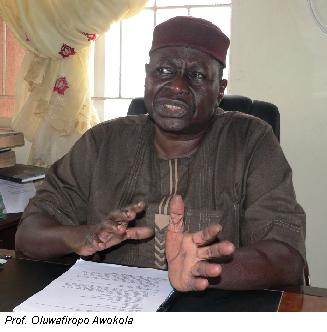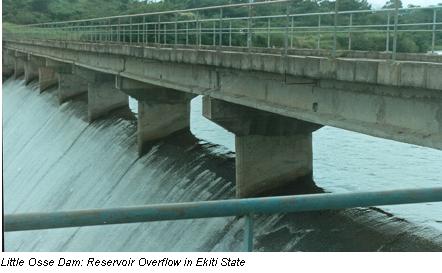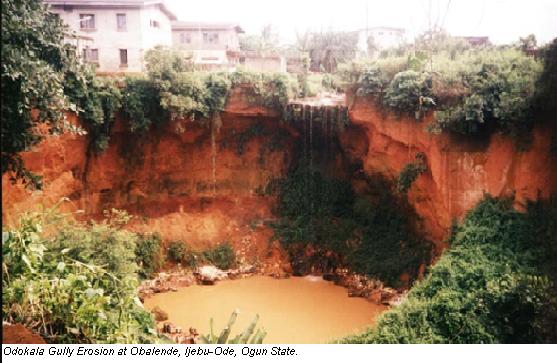A Professor of Water Resources and Environmental Engineering, College of Engineering (COLENG) of the University, Professor Oluwafiropo Awokola, has described water as the most important natural resource needed by man in all ramifications; both among the rural and urban dwellers, as he called on various governments to make water availability, their priority.
Professor Awokola, who is also a Certified Water Engineer with special focus in the areas of Open Channel Hydraulics, Analytical Hydrology, Hydrology Frequency, Hydrology Complication and Water Resources Management, said that his work had been based on the understanding that the flow regime of rivers is an essential parameter to be considered in the design of hydraulic structures; the realisation that in many developing nations, essential data are not available for most water resources engineering problems. He further stressed the need for adequate planning and development of water resources in the country to put less pressure on engineers, hydrologists and planners to analyse critically available data.
According to him, water is life and suggested that to ensure quality water production, information about the weather, immediate environment’s sedimentary and rock formation were key. Speaking further on the provision of quality water to the people as one of the major challenges facing the government of the day, Professor Awokola said that various factor had led to shortage of water, such as population explosion, opening up of new locations and cases of new sites springing up in urban areas. This, according to him, had led to the shortage of laying and expansion of water pipes, which has led most of the new communities to be springing up and providing for themselves, reliable means of water supply. He added that power supply had also been another major factor militating against the provision of water such that most water stations had to run on generators for power supply by spending more on diesel to power the generators.
On ill-functioning boreholes being drilled in major communities across the country and in some communities by some government agencies, Professor Awokola said that the only way to ensure that such was reduced is that government should set their priority right, engage the appropriate contractors with the right equipment and design to handle such jobs. He also charged the communities with such borehole to give proper monitoring and supervision in order to avoid mismanagement. He frowned at the situation where some policy makers sit in an office and merely make generalised decisions for the drilling of boreholes across the country without considering the geographical differences in the nature of the soil in various part of the country.
The Don further explained that Water Resources Engineering is concerned with the analysis and design of systems to control water quantity, quality, distribution while water resources is related to water supply (utilization) with disciplines such as hydraulics, hydrology, surface water and groundwater (subsurface).
According to him, “the development of water resources requires the conception, planning, design, construction, and operation of facilities to control and utilise water. Each water-development project encounters a unique set of physical conditions to which it must conform; hence, standard designs, which lead to simple handbook solutions can rarely be used. The special conditions for each project must be met through an integrated application of the fundamental knowledge of many disciplines”.
He described the provision of potable water as a serious business, sharing from the experience he had while on the field interacting with the Town and the Gown in Ogun, Edo and Ekiti states, among others. He mentioned others to include World Bank Multistate Water Project; Ogun State Feasibility Studies, Preliminary Design of Water Supply Schemes to 17 centres covering all Local Government areas, Surface water quantity/quality appraisal of major streams in the state, Asejire Dam Monitoring and Hydrological Analysis of Osun Basin, Baseline Survey for National Rural Water Supply Programme in Ogun State. The Baseline Survey Report defines the scope of work through identification of 400 project locations, all under Ogun State. Under the Edo State scheme, he was involved in the preparation of feasibility report on two existing water supply schemes and one new scheme for improvement of production and distribution of potable water to urban and rural areas of Edo State, with scope of work to prepare a bankable feasibility report with sufficient details to enable investment decisions to be made under the Benin-City Water Supply Scheme, Ojirami Dam Water Project for rehabilitation and completion alongside the Fugar-Agenebode scheme.
Others include the preparation of feasibility report to study the nine existing water supply schemes for improvement of production and distribution of potable water to urban and rural areas of Ekiti State. Furthermore is the need for additional systems, with the study of the following existing schemes that are classified into three catagories as the High Grade Water Supply Schemes, namely; Ero and Little Osse Water Supply Schemes, the Medium Grade Water Supply Schemes and others are found in Ado Ekiti and Itapaji Water Supply Schemes and Mini Water Supply Schemes in Ido-Ajinare, Okemesi, Efon Alaye and Ikere Water Supply Schemes, under the Ekiti State scheme. Professor Awokola added that his experience on the field had helped him to have something tangible to offer the students that he teach as a lecturer.
